GROWING PERENNIALS IN ZONE 6 OF NEW YORK STATE ... RAISING BUTTERFLIES ... COMMUNITY GARDENING
Saturday, September 15, 2018
Monday, August 6, 2018
Giant Swallowtail Butterfly Eggs (with updates)
A Giant Swallowtail Butterfly (Papilio Cresphontes) has been visiting our garden recently and deposited eggs on our Rue plant (Ruta Graveolens), a host plant for the giant swallowtail. I'm hoping to raise them indoors, away from preditors, so I snipped the branches with eggs attached and placed the stems in a vase with water to keep them fresh.
Update: August 7th
 |
The first cat emerged from its egg today. The shell will be its first meal.
Update: August 26
Seven caterpillars have been growing in my cage and the largest has reached the size of 2 inches long! I keep replenishing their supply of rue, since they're big eaters!
Update: September 10
The last of my seven giant swallowtails has formed its chrysalis. The photo shows two in the foreground and two monarch chrysalises in the background of the cage.
I think the giant swallowtails will winter over and eclose sometime in May of next year. The monarchs will eclose in a couple days and head for Mexico for the winter.
The post below from July 23rd of this year shows the Giant Swallowtail that visited my garden and laid the eggs that resulted in the above chrysalises.
Monday, July 23, 2018
Giant Swallowtail Butterfly
A highlight of the summer was today's visit by a Giant Swallowtail, rarely seen in our area. Its wingspan measured 5-6 inches. A female laid 7 eggs on our rue plant which I'm raising indoors. In 2011 I successfully raised three to adult stage and then released.
Wednesday, June 20, 2018
Vegetable & Berry Garden Update
For me, today is a perfect day to garden. It's 68 degrees and cloudy. Yesterday it rained, so the weeds are easy to pull! : )
Since we compost our kitchen scraps and use the compost in the garden, many tomato, eggplant and pepper seeds have sprouted in the garden. Also, seeds from dill and fennel pop up everywhere. I use the tiny seedlings to replace early crops as we use them. The dill is used for pickles. Swallowtail butterflies lay their eggs on dill and fennel and the caterpillars feed on those plants.
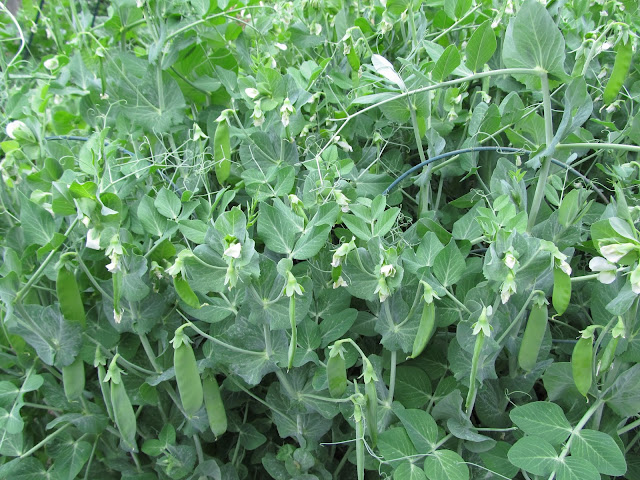 |
| The pea pods are forming. Peas were seeded April 30th. They should be ready to eat in about a week. |
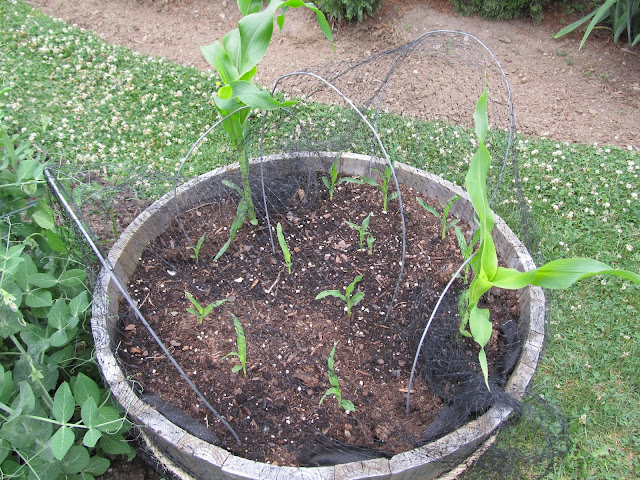 |
| Two corn plants from the first seeding, little sprouts from second seeding. |
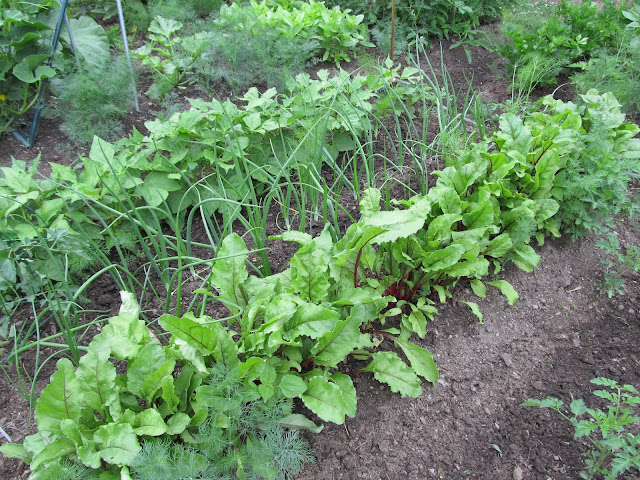 |
| Beets in foreground seeded May 6th; Spanish and Red onions in center; Yellow beans in back row seeded May 14th. Dill, fennel and tomato plants pop up here and there from the compost in the garden. |
 |
| Burpee Hybrid II cucumbers climbing between two trellises, seeded May 14th and just beginning to flower. |
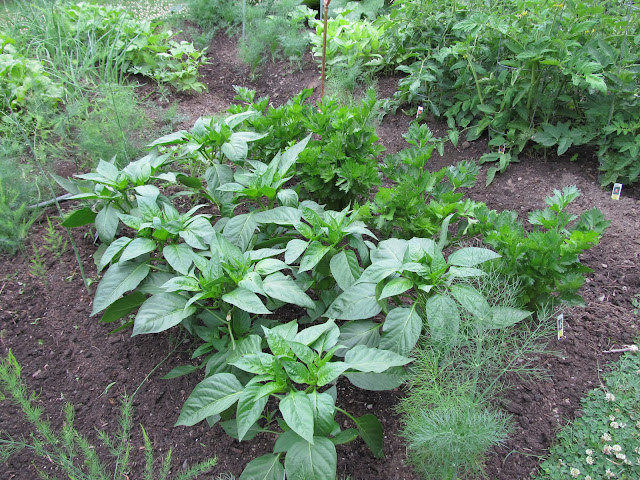 |
| Green bell peppers in foreground planted May 24th and just starting to form flowers; Celery in next row planted May 6th. |
 |
| These are the San Marzano plum tomatoes set in as plants on May 24th and starting to form fruit. |
 |
| I'm letting a few common milkweed plants grow wild in the garden to attract monarch butterflies that will lay their eggs on the leaves. The caterpillars will then feed on the leaves. |
 |
| Black Raspberry bushes full of berries that should ripen in about a week. |
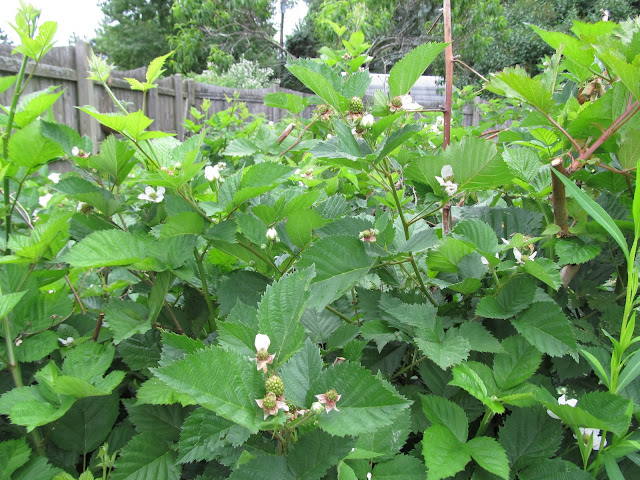 |
| Thornless blackberries flowering and forming fruit. |
 |
| Zinnias planted from seed on May 24th. |
 |
| Rhubarb |
 |
| Concord grape clusters |
Tuesday, June 12, 2018
Sunny Spot on the Porch
There's a corner of our patio that's sunny for a portion of the day where I've tucked a planter with herbs, a pot of mini eggplants, cherry tomatoes, a lantana "tree" and assorted annuals. It's near the kitchen door.
 |
| Herbs planter, pots of tomatoes, eggplants, annual flowers, hosta, milkweed, lantana tree, spearmint growing from the foundation in background. |
 |
| Herb planter (parsley, sage, rosemary, thyme, basil, oregano) with annuals in pot above on railing |
 |
| Lantana tree, in the center with mini eggplants to the right, a pot of milkweed to the left |
Sunday, May 27, 2018
The Irises are in Bloom
The irises are blooming.
Some of the milkweed leaves have monarch butterfly eggs on them. I didn't see the monarch in the garden, only the result of her visit! What a nice surprise! 12 eggs total were found.
We've been watching a couple of robins building a nest at the entrance to our perennial path, at the top of the arbor under the wisteria vine.
Wednesday, May 23, 2018
Vegetable Garden
After a few days of rain, it was so nice to get into the garden to finish planting the vegetables. Here's my list of veggies for this year:
"On Deck" sweet corn in the half barrel
Little Marvel peas
Lettuce: romaine, iceberg, leaf and buttercrunch
celery
Spanish onions
Benny's red onions
Eureka yellow beans
Moulin Rouge Beets & Detroit Dark Red Beets
Danvers Half Long carrot
asparagus (perennial)
rhubarb (perennial)
Marketmore 97 cucumbers
Better Belle peppers
Lady Belle peppers
Fairy Tale eggplant
Patio Baby eggplant
San Marzano tomatoes
Early Girl tomatoes
Better Boy tomatoes
Patio Star summer squash
"On Deck" sweet corn in the half barrel
Little Marvel peas
Lettuce: romaine, iceberg, leaf and buttercrunch
celery
Spanish onions
Benny's red onions
Eureka yellow beans
Moulin Rouge Beets & Detroit Dark Red Beets
Danvers Half Long carrot
asparagus (perennial)
rhubarb (perennial)
Marketmore 97 cucumbers
Better Belle peppers
Lady Belle peppers
Fairy Tale eggplant
Patio Baby eggplant
San Marzano tomatoes
Early Girl tomatoes
Better Boy tomatoes
Patio Star summer squash
 |
| Vegetable garden tucked into the back of our yard |
 |
| Raised bed with 4 kinds of lettuce |
 |
| 3 rows of peas with trellis for their tendrils to grab onto |
 |
| Bell pepper, celery and an eggplant |
 |
| Tomatoes in cages |
 |
| Rhubarb (with milkweed at right to attract monarch butterflies) |
 |
| Cucumbers that will grow up the trellis to save room |
 |
| Yellow beans, red and Spanish onions, beets |
 |
| Concord grape vines |
 |
| Can you see all the clusters of flower buds? |
 |
| Corn in half barrel |
 |
| Herb planter containing parsley, sage, rosemary, thyme, basil and oregano, with pot of patio eggplant and johnny jump-ups to the right. |
Saturday, April 28, 2018
Spring Things
It's time to hang the oriole feeder. I always choose April 28th as the date to hang it, since the orioles begin to enter our area about May 1st. This way, they'll be attracted to the feeder and stick around for the summer.
The feeder is filled with homemade nectar -- one cup sugar dissolved in 4 cups water. I've added oranges to the prongs on the top of the feeder and grape jelly in the outer wells. Gray catbirds also love the grape jelly!
The daffodils, crocus and hyacinths are flowering and the rhubarb that I transplanted last year from another area of the garden is doing well in its new location.
 |
| Rhubarb |
Subscribe to:
Comments (Atom)
























